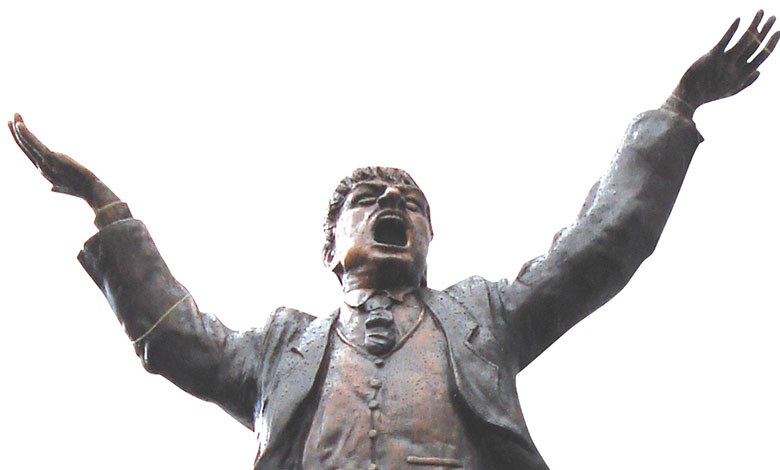TRADE UNION DESK: Pandemic highlighted absence of government’s real social engagement

As the Covid-19 pandemic highlighted, it is not enough for government to put in place mechanisms to receive the views of representative bodies such as unions, writes the ICTU’s John O’Farrell.
The UK Covid Inquiry arrived in Belfast in April 2024 and heard evidence from politicians, senior civil servants, health officials, and ‘ordinary’ people affected by the pandemic. According to NISRA’s figures, over 4,000 people died of Covid-19 related illness in Northern Ireland between February 2020 and October 2021. About 10 per cent were of working age.
These were the people for whom the ICTU’s Assistant General Secretary Gerry Murphy gave evidence on the second day of the public hearings in Belfast.
Murphy noted that the highest proportion of the 391 deaths of people of working age was amongst process, plant, and machine operatives (12.91 per cent), whereas professional and technical occupations had the lowest rates (4.5 per cent).
A great many in frontline and essential work were in lower paid roles, who could not safely work from home, and were already suffering health disadvantages. That included many who worked in health and social care, but also those who kept transport moving, who cleaned public spaces, who worked in food processing, and manufacturing.
This was acknowledged by the Chief Medical Officer, Michael McBride, who said: “With Covid-19 those at increased risk of infection included those at greater occupational risk in public facing roles; those who were unable to work from home; those from lower socioeconomic groups living in crowded or multiple-occupancy housing, who often in addition found it difficult to work from home or self-isolate for financial reasons.”
Those who had no choice but to continue to attend workplaces were at greater risk of catching the virus and passing it on to vulnerable relatives and into those communities already suffering health disadvantages.
There is never a good time to have a pandemic, but there was a confluence of circumstances which made things incontrovertibly worse. The Northern Ireland Executive had just returned after a three year suspension, and the legacy of Gideon Osborne’s austerity had reduced the capacity of public services to cope.
Nor had the refusal of NIO ministers or the devolved Executive to engage with trade unions on anything like the level seen in the devolved administrations in Cardiff and Edinburgh.
“For instance in health, the Bengoa report which was delivered in late 2016 set out the context for the transformation of health services that was required to put the services on a sustainable footing given demographic and other pressures,” Murphy said.
“The report noted that additional funding would be required to transition services to this new approach. The report recommended a ring-fenced transformation fund. The collapse of the Executive meant that none of this work was undertaken before the pandemic took hold in 2020.”
Richard Pengelly, then-Permanent Sectary of the Department of Health, stated: “The problems that were experienced during the pandemic involved the increase in the number of patients already waiting for elective procedures due to the need to divert service delivery from routine primary care and elective care in order to provide the services required to treat Covid-19 patients. This problem had its roots in the combination of under-investment in elective care and reform to clear the backlog before the pandemic.”
The constructive engagement of individual ministers in departments such as health and education, this was not sufficient in the context of the Covid-19 crisis. The Covid-19 pandemic impacted on all aspects of government; piecemeal social partnership was not sufficient to address the all-encompassing nature of the crisis.
The primary mechanism through which the Executive sought to engage with representative bodies during the pandemic was through the Strategic Engagement Forum, formed at the outset of the pandemic and brought together employers, trade unions, and statutory bodies including the Public Health Agency (PHA) and Health and Safety Executive for Northern Ireland (HSENI). After a good start mitigating the initial impact of Covid on workplaces and keeping essential commercial and public services going, the ICTU’s Murphy added that “the forum was unfortunately largely ignored by the Executive”.
“The strength of consistent and embedded social partnership is demonstrated by the tripartite arrangement which exists between the Fire Brigades Union, employers, and Chief Fire Officers, which involved considered consultation and co-working from all three sides. It is notable that not a single firefighter died of Covid-19.
“We all need mechanisms for meaningful social engagement in advance of any crisis. It is not enough for individual ministers to meet with stakeholders. It is not enough for government to put in place mechanisms to receive the views of representative bodies such as unions.
“Social partnership must be a part of the culture of government and the way in which it carries out business – embedded in advance – if the steps taken to respond to a crisis are to be effective on the ground.”





